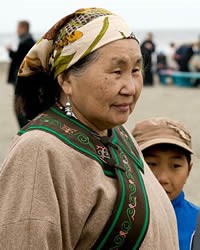Orok in Russia

Photo Source:
Anonymous
|
Send Joshua Project a map of this people group.
|
| People Name: | Orok |
| Country: | Russia |
| 10/40 Window: | No |
| Population: | 300 |
| World Population: | 1,100 |
| Primary Language: | Russian |
| Primary Religion: | Ethnic Religions |
| Christian Adherents: | 3.00 % |
| Evangelicals: | 0.40 % |
| Scripture: | Complete Bible |
| Ministry Resources: | Yes |
| Jesus Film: | Yes |
| Audio Recordings: | Yes |
| People Cluster: | Ural-Siberian |
| Affinity Bloc: | Turkic Peoples |
| Progress Level: |
|
Introduction / History
The Orok or Ulta people are small indigenous group who are located on Sakhalin Island and the city of Khabarovsk, northeastern Siberia. The Oroks belong to the Baikal or Paleo-Siberian group. The Russian Empire took over the Orok lands in 1858. Many of their customs were lost during the Soviet era, when the government forced them away from their nomadic way of life. Their traditional lifestyle was herding reindeer. The Soviet government moved them to new villages on the coast in order to take up other jobs.
Since the fall of communism in 1991, some Oroks had been allowed to return to their homeland on Sakhalin Island, but only a few have chosen to do so. The Orok language has not been written down. Orok is a dying language with Orok young people preferring to speak Russian.
What Are Their Lives Like?
The traditional occupation of the Orok was herding reindeer. The reindeer provided the Orok with food, clothing and transportation. The Soviet government had a policy of changing nomadic peoples into people who lived in one place. The Orok had to leave Sakhalin Island and move to the Siberian mainland. The Orok took up jobs in fishing, mining, logging, and trapping animals. Reindeer have given way to snow mobiles.
The Orok are slowly becoming part of the general Russian Siberian population. Their language is disappearing and may be lost in the next decade or two. Young people are moving to cities and towns in search of a better life. Young people often marry outside of Orok people and consequently lose their language and culture.
A rite of passage for Orok boys was a Sturgeon Hunt. The boys went out for a week with little food. Once a sturgeon fish was caught the boys would take a tooth from the fish and mark their heads and arms with it. This traditional event is no longer occurring among the Orok.
What Are Their Beliefs?
Most Orok practice folk religion and ancestor veneration. During the Soviet era, all types are religion were persecuted. Many Orok became secular. A few today still believe in natural spirits that can influence the lives of the people. A small fraction of the Orok claim to be Russian Orthodox Christians.
What Are Their Needs?
The Orok need help in preserving their language and culture. Some rural Orok lack access to modern medicine. As a result, they have a lower live expectancy lives than the Russian population. Most of all, the Orok need to hear the good news about Jesus Christ. He alone can forgive their sins and grant them eternal life.
Prayer Points
Ask God to lead a mission agency to begin translating the Bible into Orok.
Pray that God would open doors for missionaries to work amongst the Orok.
Ask God to open the hearts of this people group to Christ's message of salvation.
Ask God to preserve the Orok culture and language.
Pray that Russian Christians would share the good news of Jesus with the Orok people in an effective and powerful way.
Pray that the Orok people will put their identity in Christ, giving them a new hope and joy.